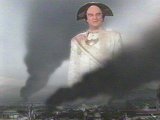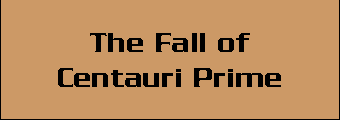- One of the first things the Drakh said to Londo was
the Vorlon question, in this case, "Who are we? What are we but a
shadow of a shadow?" Most likely it's completely innocuous, but it's
possible that with their masters gone, are the Drakh now
beginning to ask themselves questions other than the one put forth
by the Shadows.
- The Drakh told Londo that they wanted a home. That's the
same thing the Drakh representative told Delenn in
"Lines of Communication."
If she had given them a world as they'd requested, would they have
settled there and not come in force to Centauri Prime? Likely not;
they were already on Centauri Prime in at least some capacity, since
the Regent had already been implanted with a Keeper
("Epiphanies").
The Drakh desire for a homeworld echoes the telepaths'
struggle for the same thing. Both the servants of the Vorlons and
the servants of the Shadows have been left adrift and homeless after
the First Ones' departure.
- The Regent was under Drakh control, but there may have
been others; someone had to plant the fusion bombs all over Centauri
Prime (assuming that wasn't just a bluff) and place the Shadow pods
on the Centauri warships. Obviously it's possible that all this was
done by ordinary Centauri under the Regent's orders (which can only be
disobeyed on threat of death, as Londo said in
"In the Kingdom of the Blind")
but the question still remains, how many other Centauri
are under Keeper control?
- The Regent died when his Keeper was removed, but in
"Racing Mars,"
Captain Jack survived the loss of his Keeper -- and it even grew back.
Maybe it's simply that the Regent's Keeper completely removed itself,
while Captain Jack's was still partially in place. Or it may be that
a Keeper can control whether its host lives or dies when it leaves.
- Keepers grow, or at least live, on the bodies of Drakh.
That suggests that the Keepers aren't independent entities per se, but
are instead appendages of the Drakh. Shadow organic technology can
receive instructions over large distances as evidenced by the pods,
so it's possible that Keepers employ the same techniques to stay in
contact with their parent Drakh even when far away.
It may also be the case that Keepers are in extremely short supply;
for example, it's possible that each Drakh can only be linked to
a single Keeper.
- Accepting the Keeper -- and the position of Emperor --
may have been the fulfillment of the last of Lady Morella's prophecies
("Point of No Return"):
"You must surrender yourself to your greatest fear, knowing it will
destroy you." Londo accepted the loss of his autonomy and moved one
step closer to his dream of death
("The Coming of Shadows")
for the sake of saving his people.
- Londo's acceptance of the Keeper, self-sacrifice for the
sake of his people, is in line with the Third Principle of Sentient
Life as taught to Minbari
("A Voice in the Wilderness").
- Londo told Sheridan that in exchange for freeing Delenn,
he might ask Sheridan for a favor in the future. What nature of favor
did he have in mind? Was asking for a favor Londo's idea or the
Keeper's? Londo has exchanged favors for favors before
("A Voice in the Wilderness")
and the fact that his tone abruptly became belligerent just after he
asked for the favor implies that the Keeper took control of him at
that point.
On the other hand, this favor may just cancel out the one Londo
already owed Sheridan for telling him about the approach of the Vorlon
fleet
("Falling Toward Apotheosis").
- Delenn speculated that she and Lennier might find a
million-year-old jumpgate left behind by the First Ones. That has
already happened at least once
("Thirdspace").
Given what happened in that case, Delenn would probably have second
thoughts about actually trying to activate such a device.
- The Centauri warships that rescued Delenn and Lennier
might well have been preparing to destroy them, only to receive orders
to the contrary from Centauri Prime at the last moment.
- Lennier's admission to Delenn probably won't change her
attitude toward him significantly, since as she said, she already knew
he was in love with her. But it may eliminate any possibility that
he can maintain his facade of platonic devotion toward her, and may
make it harder for him to convince himself that he can win her love.
- How did Londo convince the Drakh not to kill Delenn?
Or did he give the order on his own? If the Keeper didn't regard such
an order as a threat to its interests, it might have allowed him to
do so.
- What were the reparations demanded of the Centauri?
Are they the reason the Centauri apparently still hadn't rebuilt after
17 years
("War Without End")?
Why would Sheridan go along with a demand that would crush an entire
world for two decades? As a student of Earth history, and given his
familiarity with World War II in particular
("In the Shadow of Z'ha'dum")
Sheridan must have recognized that crushing war reparations can have
unintended consequences, e.g. the rise of the Nazi party in a Germany
crippled by humiliating sanctions after World War I. Why would he
risk something similar happening on Centauri Prime?
One possibility is that he felt he had no
choice; the Narn and Drazi had already amply demonstrated their
willingness to take matters into their own hands when they weren't
getting satisfaction from the Alliance. Sheridan may have felt that
anything less than outrageous sanctions would prompt some of the
Alliance races to start killing again.
It's also possible, of course, that the reparations will have nothing
to do with the state of Centauri Prime seventeen years hence (at which
time there will once again be fires burning in the capital city.)
Perhaps Centauri Prime's future condition will be due to the Drakh
or the war against them (which will take place in the next twenty
years, according to Delenn's recollection at the end of
"Rising Star.")
- The Narn and Centauri are now mutually responsible for
large numbers of civilian deaths on each other's homeworlds. Each
homeworld ended up under the control of enemy forces after being
bombarded, though most of the Centauri don't know about their occupiers
yet.
- The particulars of Londo's speech were almost certainly
dictated by the Drakh. By isolating Centauri Prime from the other
worlds, the Drakh will more easily be able to work in secret without
attracting the Alliance's attention.
- Londo said the Centauri were now alone in the universe.
That resonates with Kosh's description of the Centauri
("Midnight on the Firing Line"):
"They are alone. They are a dying people. We should let them pass."
- Londo referred to the war, and the attack on Centauri
Prime, as "the long night." Is that related to Kosh's message to
Sheridan in
"Day of the Dead,"
"When the long night comes, return to the end of the beginning?"
- This is the second time Londo has sent Vir away to
protect him from Shadow influence; he arranged for Vir to be the
ambassador to Minbar in
"A Day in the Strife."
- Franklin said, "We know the Shadows had hundreds of
allies." Did he mean hundreds of individuals, or hundreds of races?
If the latter, who were the Shadows' allies besides the Drakh, and how
does Franklin know about them?
One possibility is that the word "Drakh" refers to Shadow servants in
general, not one particular species. That would also explain why the
Drakh on Centauri Prime doesn't look like the alien who boarded the
White Star in
"Lines of Communication."
(That alien identified himself as an emissary of the Drakh, though,
so it's possible he wasn't Drakh at all.)
- Is the Vorlon homeworld related to the new Earth
mentioned in
"The Deconstruction of Falling Stars?"
That episode took place a million years in the future, at which time
humanity would, according to Lyta, be allowed onto the Vorlon
homeworld. There's some symmetry if the Vorlon homeworld is the new
Earth: the Drakh had a home but lost it thanks to the Vorlons (in the
form of Lyta's enhanced powers, which set off Z'ha'dum's self-destruct
mechanism in
"Epiphanies")
while humanity lost a home but gained a new one thanks to the Vorlons.

